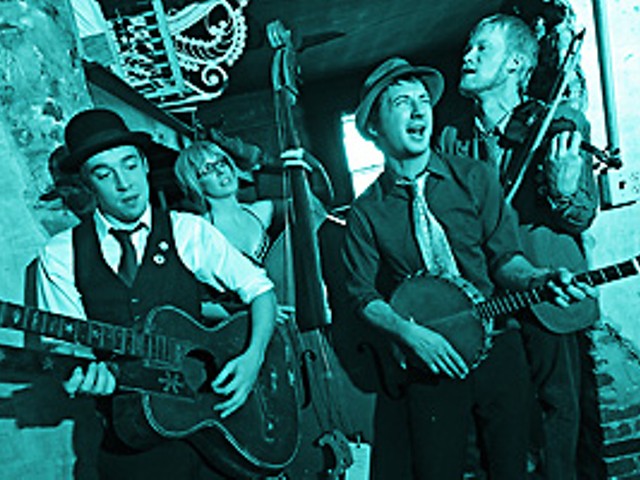When I Explode
On the surface, it's surprising that Explosions in the Sky — a Texas band known for its moody, extended post-rock instrumentals — would be able to amass the kind of diverse fan base it has since forming in 1999. But the band's universal appeal actually makes a lot of sense: The quartet is known for its unpretentious demeanor and personal sincerity, along with dynamic songs which let listeners draw their own conclusions. It doesn't hurt that the quartet's melodramatic dreamscapes are perfectly suited for cinema — such as the big-budget Hollywood blockbuster Friday Night Lights, for which the band contributed music. B-Sides spoke with drummer Chris Hrasky over the phone shortly before the band left for its current U.S. tour, in support of last year's All of a Sudden I Miss Everyone.
B-Sides: You're the only member of the band who is not originally from Texas. How did you end up playing music with the other guys?
Chris Hrasky: I grew up in Illinois and was living in Chicago when I got accepted into graduate school in Austin at the University of Texas. I didn't really care much for the graduate school, so that didn't last long, about a month. The other three guys had all grown up in the same west Texas town, Midland. We became really good friends pretty quickly. Those guys had all played in bands together over the years, so we got a little practice space and just kind of started from there, really, with no intention of doing anything other than making music for ourselves.
Did you guys have similar musical backgrounds and influences?
Yeah, there was definitely a lot of bands and music that we shared interest in. Some of us in high school listened to a lot of Southern California skater-punk and pop-punk type stuff, but then from there we all started listening to Dinosaur Jr. and stuff like that.
What made you move in the direction of the music you make in Explosions in the Sky?
I guess just the same sort of ways that anyone's musical interests kind of expand. We started getting into stuff like Dinosaur Jr. — and then, like, Nirvana breaks and you see [Kurt Cobain] wearing a Sebadoh T-shirt and it's like "Who's that band?" But from pop-punk to Explosions in the Sky was like a ten-year trajectory. Two bands that were big for all four of us when we met were Mogwai and Dirty Three, so that's more of a clear connection.
At what point did you realize that you weren't going to include vocals in your music?
It was just a decision from the beginning. We all decided that we wanted to be in a band where everyone involved was a key ingredient, instead of having a guy who was a songwriter with the other three guys backing him up.
When you released Those Who Tell the Truth Shall Die, Those Who Tell the Truth Shall Live Forever in 2001 you gained some controversial attention because of rumors that the album had some connection to 9/11. How annoying was it to deal with?
I guess the most annoying thing about it was what the controversy was based off of wasn't even true. It was this rumor that the record came out on September 11 and it has this thing that says "This plane will crash tomorrow." But the record actually came out in August and for whatever reason someone wrote that it came out on September 11 and people picked up on that.
Just another one of the absurdities going on at the time?
Yeah, it was just kind of a weird thing to be recognized for. A guy who worked for our UK label at the time actually suggested at one point that we play up that angle and it was like, "Are you nuts?"
Why do you think people have connected with what you're doing?
My hope — and what I think is happening — is that people can just respond to the music emotionally, and because it is instrumental they can maybe personalize the music in a way. Our goal is to write music that moves us. To have other people react in a similar way is great — and it seems like there are a lot of different types of people who are listening, as opposed to just, like, the dudes who read Pitchfork every day.
— Shae Moseley
8 p.m. Saturday, March 29. The Pageant, 6161 Delmar Boulevard. $15. 314-726-6161.
By the Numbers
Rarely, if ever, do we get jealous of Chicago — save for its big pizza and its 4 a.m. bars, which means that the city's still partying while we're driving through Taco Bell. But there's one thing St. Louis can't claim: The 1900s. And now we're officially stamping our feet and whining, "No fair!"
Each exuberant element of the band's sound calls to mind different comparisons: the boundless organ favored by the Zombies; John Denver's tranquil simplicity; the honeyed vocal interplay of Fleetwood Mac or the Mamas & the Papas; and the omnipresent tension of the Velvet Underground. But even with these various influences, the 1900s aren't close to being a rip-off; it's like the band took only the best parts from these classic groups and combined them to design and birth a pretty little pop baby. In fact, the band was born so perfect that it signed to the Urbana, Illinois, label Parasol after its very first public show, in May 2006.
Now seven members strong, the 1900s' first full-length for Parasol, Cold & Kind, is an indie-pop masterpiece. Main songwriter/vocalist Edward Anderson says the band wanted to make a "big, epic record," and though the process was grueling (all band members still have day jobs) he modestly admits that "[Kind] seemed to come out all right." Credit this satisfaction to his creative approach to music: Although Anderson writes lyrics the old-fashioned way — "I'll just sit and smoke a lot of cigarettes and drink, like, a bottle of wine and try to figure it out" — recording music is another story.
"Like, the first run-through will be maybe on my phone while I have an idea," he says. "And then I'll do it on GarageBand for a couple weeks or months or whatever it takes, kinda iron it out. Then I'll do a ProTools demo, then I'll give a CD to the band. [The songs] usually change quite a bit [when] they all add their parts."
For being barely two years old, the 1900s have received a ridiculous amount of good press. In fact, it's nearly impossible to find a negative printed word. When questioned about this phenomenon, Anderson laughs and seems embarrassed. "Kind of miraculously, for the most part [the press] has been pretty good," he says. "In Chicago a lot of people have the perception that we're this band that made it and everything, because we do really well [there] and all the papers write about us and stuff. But then we go on tour and no one knows who we are.
"For us the main goal is to try to get a little more known outside of the city. It's kind of exciting, though. You get people on MySpace or all over the world writing and stuff and someone will be like 'Oh, there's some teenagers in Paris listening to the record,' and it's like, 'Oh, that's strange.'"
— Jaime Lees
9 p.m. Saturday, March 29. The Billiken Club, 20 North Grand Boulevard. Free. 314-977-2020.






